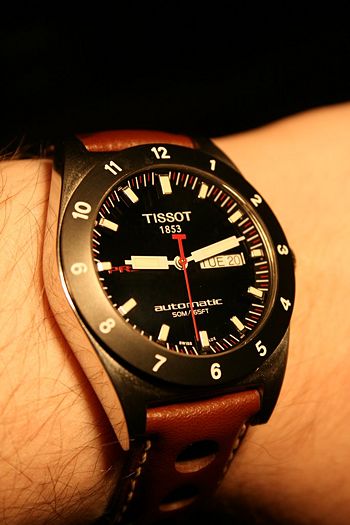Wristwatch: Difference between revisions
imported>Robert W King |
imported>Robert W King |
||
| Line 11: | Line 11: | ||
Meanwhile in other places around the world, different mechanisms were used to keep time although most were based on units of water flow over time. The greek word clepsydras ("water thieves") was used around 325 BC to describe stone vessels that were shaped in such a way so that water could flow out in a rate that would fill another vessel that was marked. The big difference was that these clepsydras did not rely on celestial positionings. Their primary disadvantage was accuracy: water is subject to the environment around it, and was extremely difficult to measure in accurate quantities. | Meanwhile in other places around the world, different mechanisms were used to keep time although most were based on units of water flow over time. The greek word clepsydras ("water thieves") was used around 325 BC to describe stone vessels that were shaped in such a way so that water could flow out in a rate that would fill another vessel that was marked. The big difference was that these clepsydras did not rely on celestial positionings. Their primary disadvantage was accuracy: water is subject to the environment around it, and was extremely difficult to measure in accurate quantities. | ||
In the early 14th century, large mechanical clocks were invented and used in cities in Italy. They were driven by weights, and were regulated by a [[verge-and-foliot escapement]]. | In the early 14th century, large mechanical clocks were invented and used in cities in Italy. They were driven by weights, and were regulated by a [[verge-and-foliot escapement]]. This method of regulating time was implemented over 300 years, until the invention of spring-powered clocks by Peter Henlein somewhere between 1500 and 1510 in Nuremburg. This was the first key component allowing better, portable clocks. | ||
The next key invention was developed in 1675 by Christiaan Huygens, a Dutch scientist who had done work with pendulums. | |||
==Anatomy== | ==Anatomy== | ||
Revision as of 17:48, 15 December 2007
A wristwatch is a time piece designed to be worn around the wrist, held together by a band. Modern wristwatches are often referred to simply as "watches", and are mostly electronic, despite having either an analog or digital appearance. There are wristwatches that are still entirely mechanical but because of the higher manufacturing and maintenance cost, these are becoming more rare and are considered "luxury items" or "antiques".
Brief history of timekeeping
At some point in civilization (approximately 5000-6000 years ago[1]), it became important for Middle Easterners and Northern Africans to start managing time more efficiently.
The earliest device for dividing time into units was possibly created by the Egyptians around 3500 BC (although the Sumerians may have had similar structures). It was the obelisk, and allowed observable change in units throughout the day from a moving shadow that indicated the change in position of the sun. A similar device, the shadow clock, came into existence around 1500 BC and was divided into real, measureable units to determine time of day. The shadow clock divided the day into ten sections with two sections for parts where the sun was either setting or rising. At the midpoint of the day, the device was rotated(in this sense signifying an early way of dividing up AM and PM).
Meanwhile in other places around the world, different mechanisms were used to keep time although most were based on units of water flow over time. The greek word clepsydras ("water thieves") was used around 325 BC to describe stone vessels that were shaped in such a way so that water could flow out in a rate that would fill another vessel that was marked. The big difference was that these clepsydras did not rely on celestial positionings. Their primary disadvantage was accuracy: water is subject to the environment around it, and was extremely difficult to measure in accurate quantities.
In the early 14th century, large mechanical clocks were invented and used in cities in Italy. They were driven by weights, and were regulated by a verge-and-foliot escapement. This method of regulating time was implemented over 300 years, until the invention of spring-powered clocks by Peter Henlein somewhere between 1500 and 1510 in Nuremburg. This was the first key component allowing better, portable clocks.
The next key invention was developed in 1675 by Christiaan Huygens, a Dutch scientist who had done work with pendulums.
Anatomy
A wristwatch is comprised of three main pieces: a watchband, the watchface, and the crystal which protects in components inside the watchface. Most crystals are made from plexiglass, ordinary glass referred to as "mineral glass", or synthetic sapphire. Some crystals are made from a combination of sapphire and mineral glass, usually assembled in layers. Seiko, a large watchmaker, makes a type of crystal that is mineral glass covered by a layer of synthetic sapphire which it called "Sapphlex".
The three types of crystals have different costs, plexiglass being the cheapest, is the least likely to shatter but is extremely scratch-prone. Mineral glass is tempered is more likely to break but is more scratch-resistant. Synthetic sapphire, having the greatest hardness is the most expensive but is brittle, and easily shatters due to it's crystalline structure.
References
- ↑ A Walk Through Time:The Evolution of Time Measurement through the Ages. National Institute of Standards and Technology (NIST) (2002-04-30). Retrieved on 2007-12-15.
